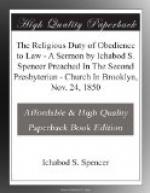This principle is carried out in all the teachings of the New Testament, with an emphasis and a plainness which no candid and unprejudiced mind can fail to understand. Jesus Christ has incorporated it into his sermon on the mount in many particulars, wherein he insists upon our social duties, while he teaches religion. He preached this principle when he said, “render unto Caesar the things that are Caesar’s, and unto God the things that are God’s.” He practised on this principle when he made the fish bring in his mouth the tribute-money which, as a citizen, he owed to the government of the country,—a government a thousandfold more oppressive than ours.
It would be a fundamental error, if we were to maintain, that religion has nothing to do with the regulation of our conduct towards one another,—as parents, as children, as magistrates, subjects and citizens; but that it has left all that field of duty to be regulated by the individual preferences of men. It has not done so. Social duties come as really within the field of religious obligation, as any other duties. “The fifth commandment requireth the preserving the honor and performing the duties belonging to every one in their several places and relations, as superiors, inferiors, and equals.” As men, in any relationship we hold, neighbors, citizens of the state, children, parents, or any other earthly connection, religion extends its authority over us; and our conduct in each one of these relationships constitutes a part of our holiness or our sin.
God has not seen fit to enact special or particular laws for us, to regulate our conduct in all respects, as here associated with one another, and owing duties to one another, as neighbors, citizens of the commonwealth, husbands, wives, and children. He has himself enacted only general laws for us,—laid down great general principles, under the authority and light of which, he has left men to regulate the particulars as they please, by the governments which they establish.—only not contravening his great general principles and laws.
He has himself made all the laws which are needful, and all which can be justly obligatory upon us in respect to divine worship,—such duties as praise, prayer, preaching the gospel, and observing the sacramental ordinances;—and no human authority may either repeal these laws or add to them. But in respect to the duties which we owe to our neighbor, that is, to our fellow-man, in any relation he holds to us or can ever hold; God has left the most of these duties to the authoritative decision of human governments. He has thus made a difference betwixt these two classes of duties. The reason for this difference seems to be this; namely, man’s wisdom can reach farther in ascertaining what is fit or right betwixt him and his fellow-man, than in ascertaining what is fit or right betwixt him and his God: and consequently, man can legislate




